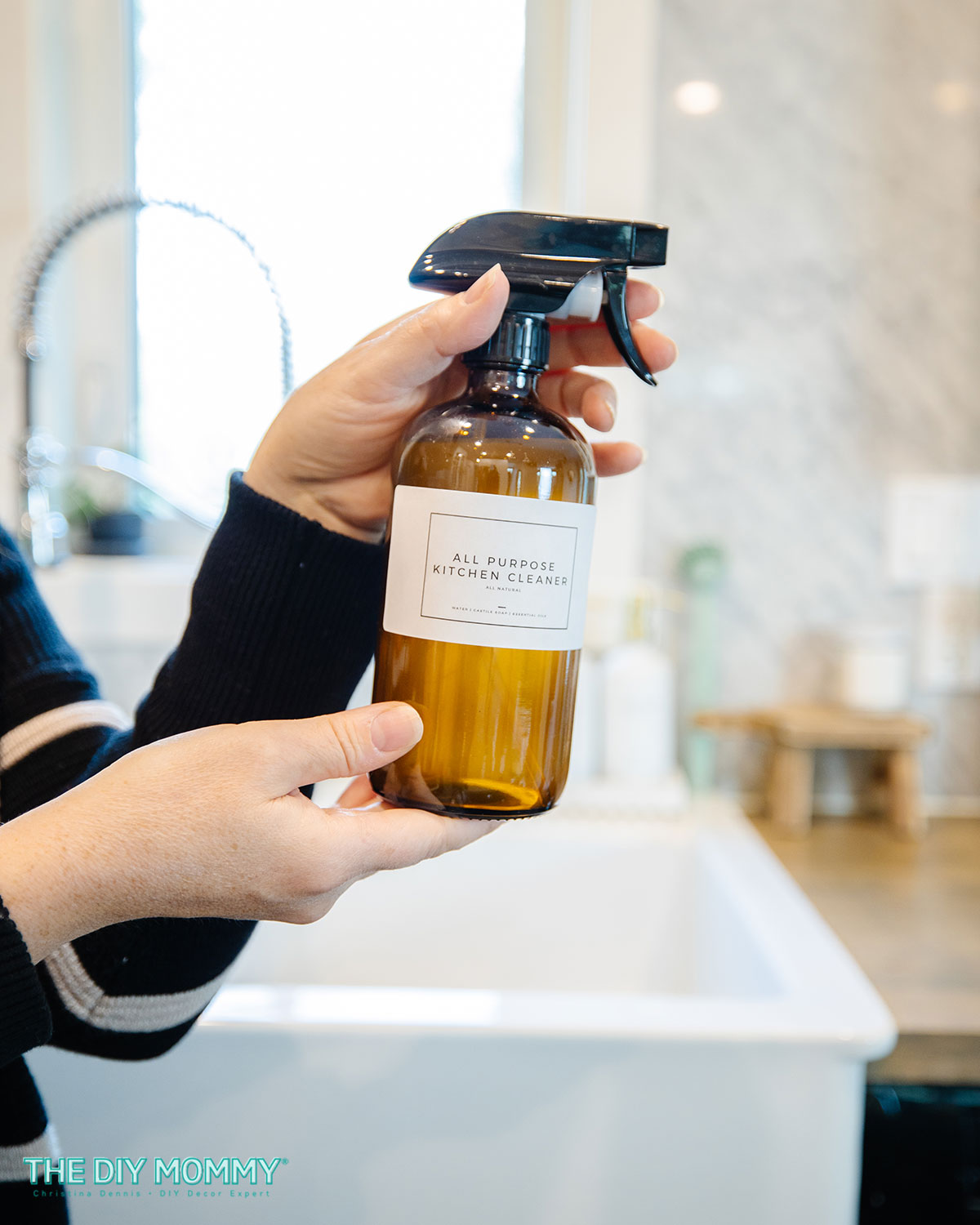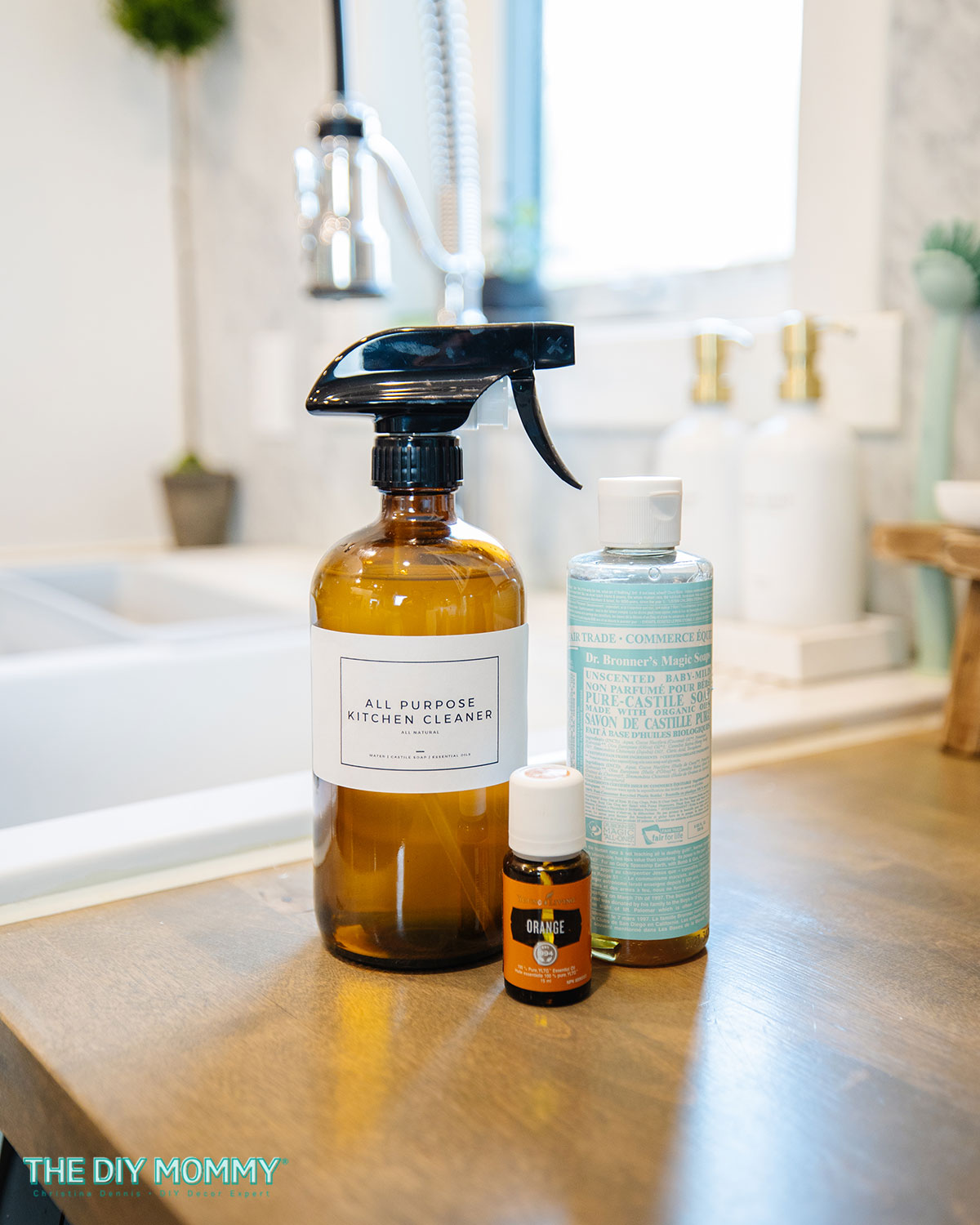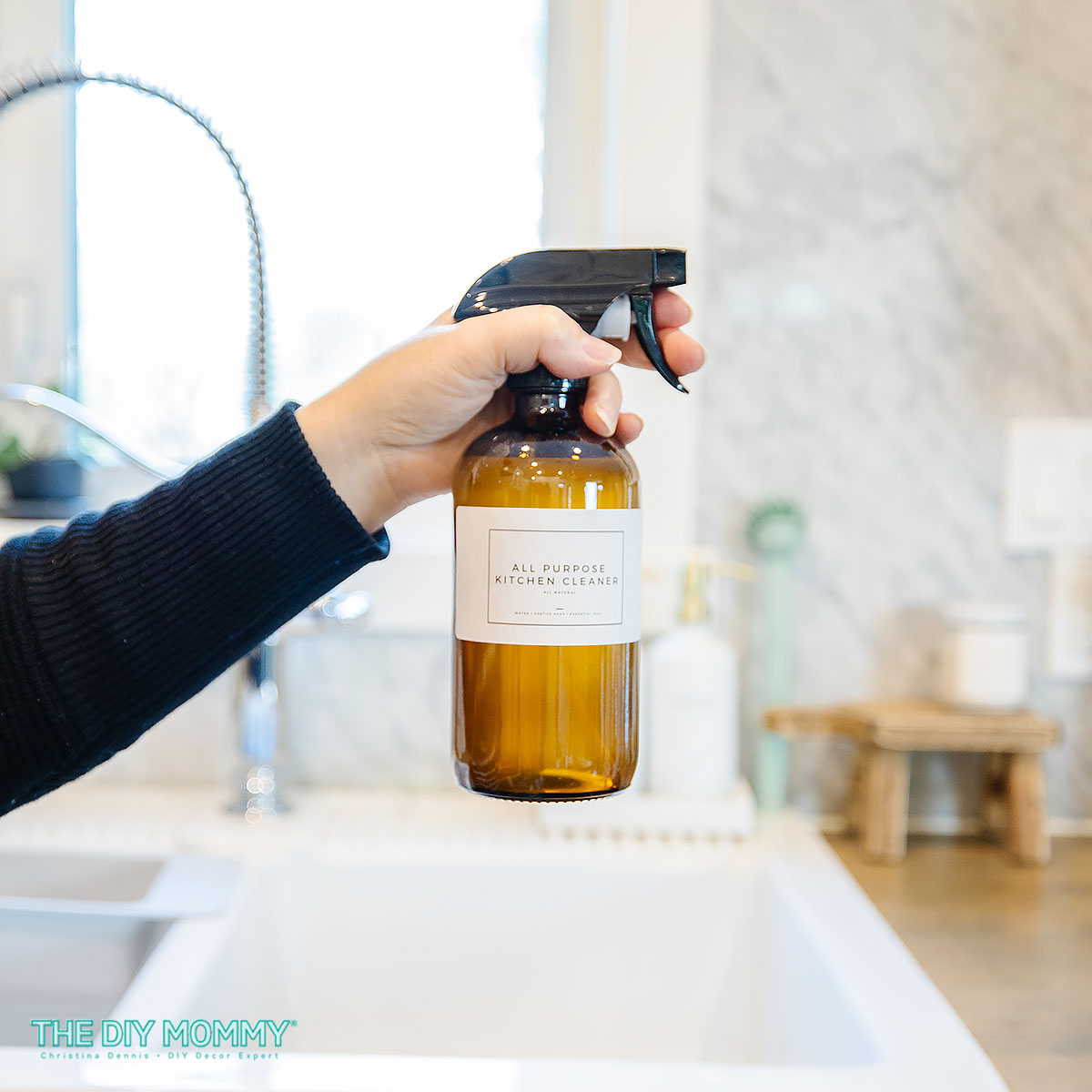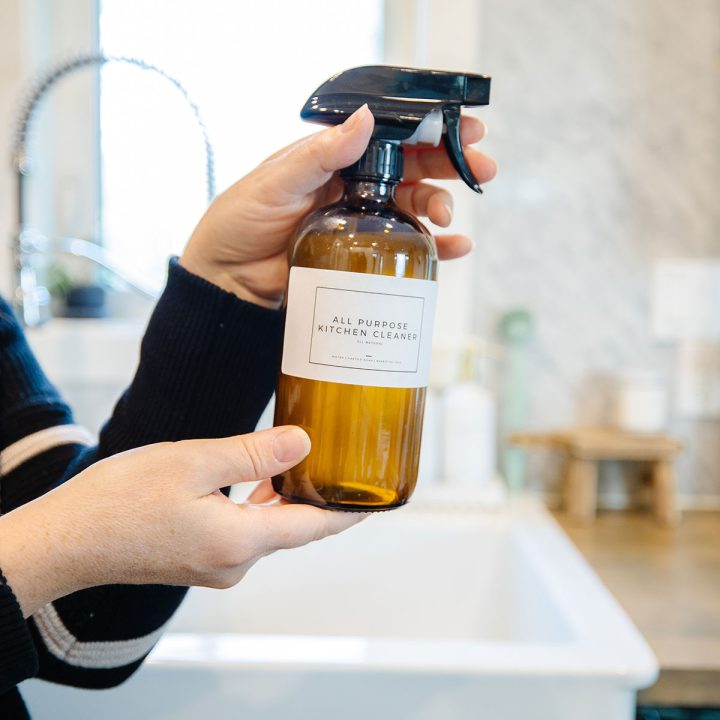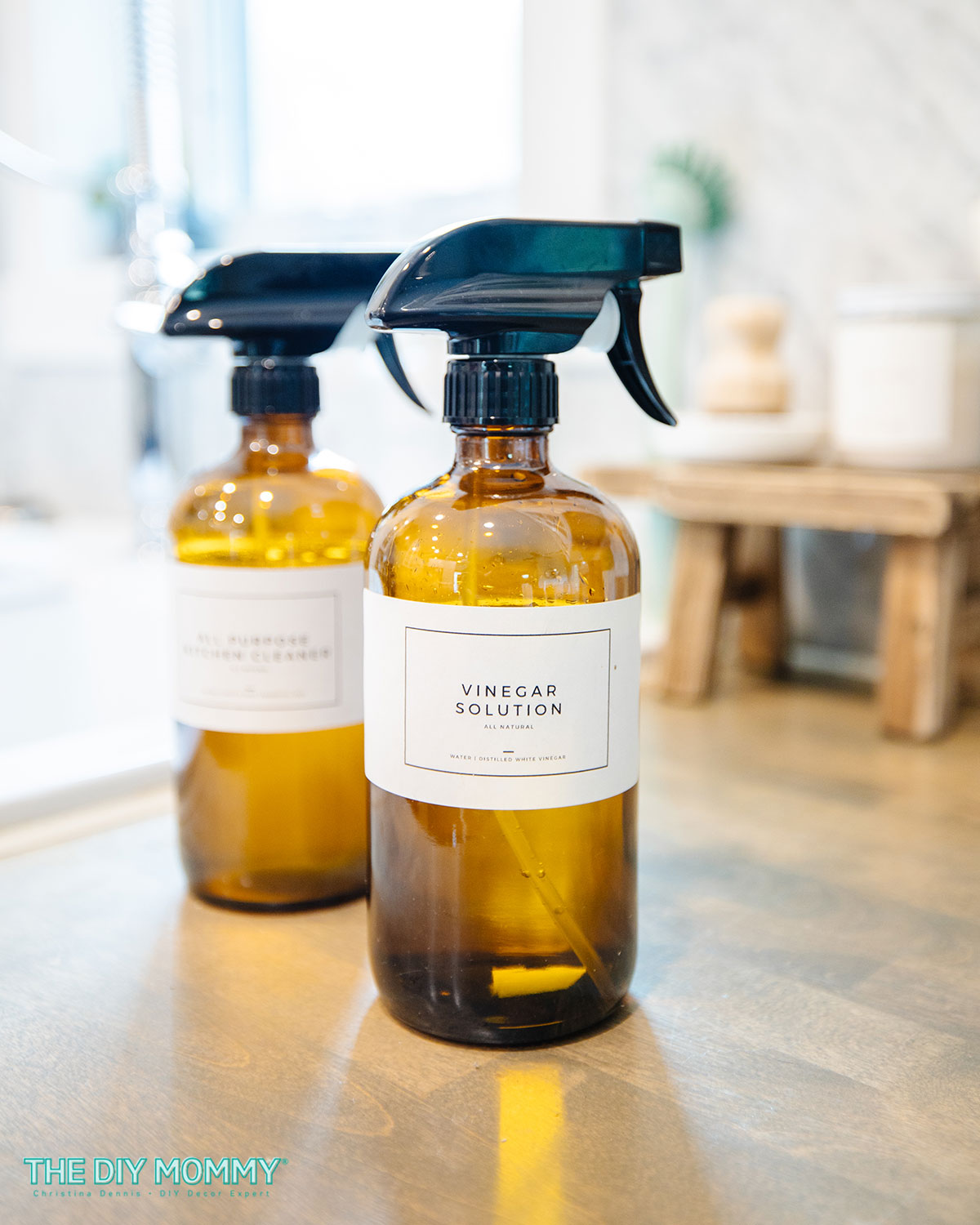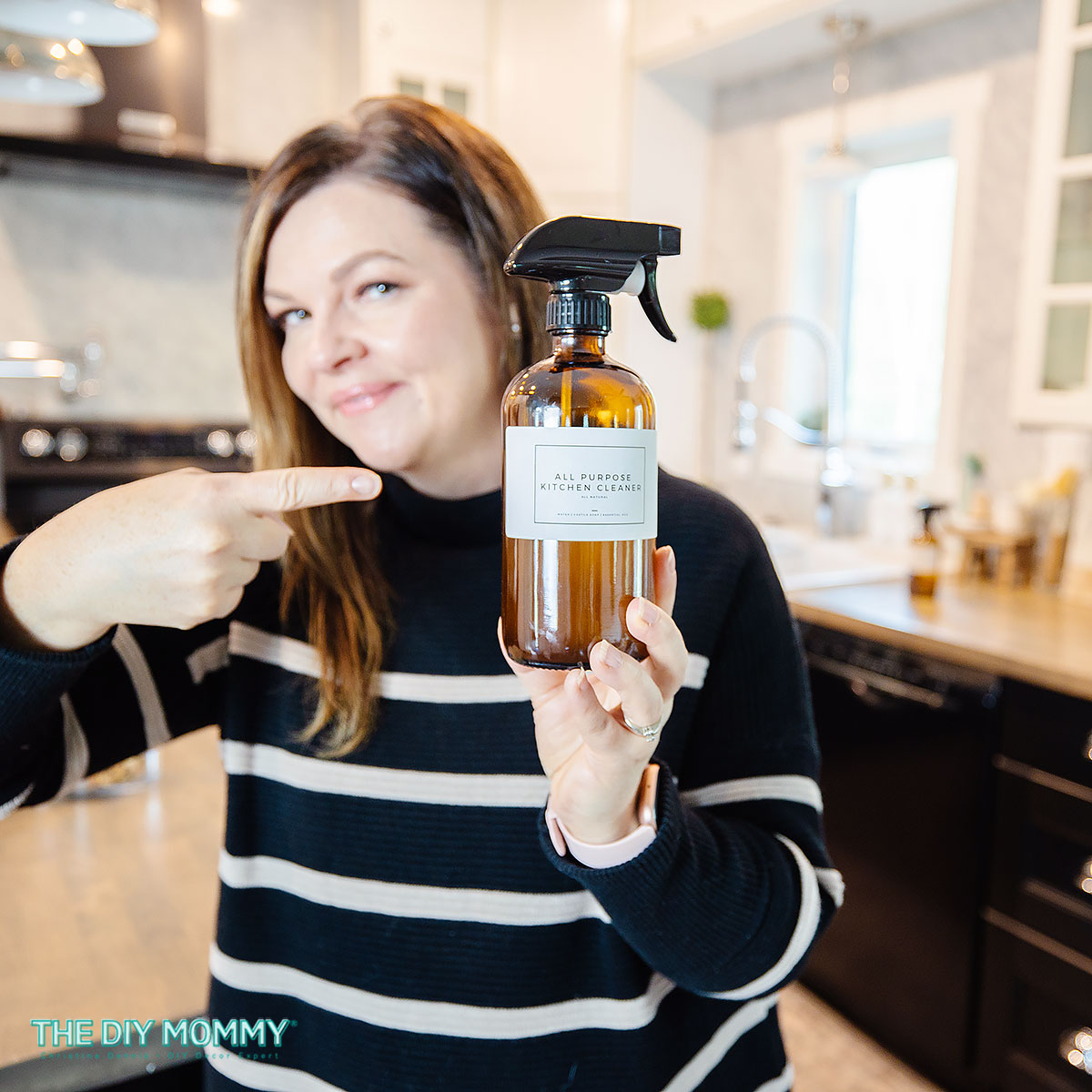Make the Best All-Purpose DIY Kitchen Cleaner
This post may contain affiliate links · This blog generates income via ads
Cleaning the kitchen can be a real chore, especially if you have to use multiple cleaners for the different surfaces in your space. It can cost a lot of money, and use up a lot of your valuable time. What if there was a single kitchen cleaner that could clean practically every surface in your kitchen? Look no further than this easy-to-make DIY kitchen cleaner.
Over the last couple of years that I’ve owned vacation rentals, I’ve been really getting into homemade cleaners. Cleaning solutions are expensive, plus a lot of them have overwhelming scents and a lot of ingredients. This DIY kitchen cleaner is one of my absolute favourite homemade cleaners to use in my vacation rentals and in my own kitchen, too. It uses one of my favourite ingredients for cleaning – castile soap – plus a couple of other ingredients to make it able to tackle most any mess in my kitchen. Today, I want to share my simple homemade kitchen cleaner recipe with you!
How to Make an Effective DIY Kitchen Cleaner
To make this all-purpose kitchen cleaner, you’ll need just a few simple ingredients:
- glass spray bottle
- water
- liquid castile soap
- essential oils like orange, lemon or lavender (if desired)
Start by pouring 2 cups of water in a glass spray bottle. Next, pour 1 tablespoon of liquid castile soap and 5-10 drops of essential oils (if desired) into the bottle. Shake the mixture well before each use. That’s it! This cleaner is ready to tackle even the toughest kitchen messes. To use the cleaner, simply spray it on any surfaces you want to clean, then wipe the surface with a microfiber cloth or a sponge.
Watch my video on how to make this DIY kitchen cleaner
Free Printable DIY Kitchen Cleaner Labels
If you want to use my cleaning bottle labels, right click on the images below, save to your computer, and print on label paper or sticker paper!
Where can you use this DIY kitchen cleaner?
But just how versatile is this all-purpose DIY kitchen cleaner? The answer: very versatile. It can be used on countertops, sinks, stovetops, and even floors. The soap helps remove any grease, oils and messes from your surfaces and it’s non-toxic. Lavender essential oil can be anti-fungal, but it’s entirely optional. You can also try other essential oils like tea tree oil, lemon oil, or orange oil. This solution is a natural cleaning powerhouse!
For use on baked-on grease or debris like what you might find on a stove top, I like to sprinkle the surface with a bit of baking soda. Then, I spray this cleaner on top and scrub with a rough sponge (I like the Scrub Mommy). Alternatively, you can mix a bit of lemon juice into the baking soda to make a paste and apply that to the stove top before scrubbing.
Tip: Don’t add essential oils to your kitchen cleaner if you have people in your household with scent sensitivities.
How much does it cost to make?
One great thing about this DIY kitchen cleaner is that it’s incredibly affordable. If you’re used to buying separate cleaning products for each surface in your kitchen, you know how quickly those costs can add up. With this DIY cleaner, you can save money and simplify your cleaning routine. Plus, because you’re making the cleaner yourself, you know exactly what ingredients are in it. No more mystery chemicals!
To make about 2 cups / 16 oz. of this cleaner, it currently costs around 50 cents (Canadian Dollars). That’s a huge savings considering a natural all-purpose kitchen cleaner of about the same volume is currently around $5.00.
Is this DIY kitchen cleaner eco-friendly?
Another benefit of this DIY kitchen cleaner is that it’s eco-friendly. Conventional cleaning products can contain all sorts of harsh chemicals that are bad for the environment. When you make your cleaner, you have complete control over the ingredients, which means you can make choices that are better for the planet. Plus, you can make this in a glass spray bottle that you can reuse again and again so that you buy less single-use plastic spray bottles.
Does this cleaner actually work, though?!
Finally, and perhaps most importantly, this DIY kitchen cleaner just works. It’s tough enough to tackle serious kitchen messes – think baked-on grease or stubborn food stains – but gentle enough for everyday use. Plus, because it’s made with familiar ingredients, you can use it with confidence. No more worrying about whether you’re using the right product on a particular surface. This all-purpose cleaner is, as the name suggests, good for just about everything in your kitchen.
DIY All-Purpose Kitchen Cleaner
What if there was an inexpensive, single kitchen cleaner that could clean practically every surface in your kitchen? Look no further than this easy-to-make DIY kitchen cleaner.
Ingredients
- 2 cups distilled water
- 1 tbsp liquid castile soap
- 5-10 drops essential oil like lavender
- glass spray bottle
Instructions
- Pour 2 cups of distilled water in a glass spray bottle.
- Pour 1 tablespoon of liquid castile soap and 5-10 drops of essential oils (if desired) into the bottle.
- Shake the mixture well before each use.
- To use the cleaner, simply spray it on any surfaces you want to clean, then wipe the surface with a microfiber cloth or a sponge.
Can I mix dish soap with vinegar to make this cleaner more effective?
Mixing an acid like distilled white vinegar with a base like castile soap or Dawn dish soap causes a neutralization reaction (source) making each ingredient less effective. I do love using vinegar or a mixture of vinegar and water to clean certain things like stainless steel, mirrors, glass shower doors, faucets and laundry stains. It’s a great deodorizer, and it cuts grease & oils really well.
You can keep a mixture of 1 to 1 water & vinegar on hand in a separate glass spray bottle. Vinegar can act as a disinfectant (source), though not as powerful as using bleach to kill bacteria & germs. Spray it on surfaces that have been cleaned with the DIY kitchen cleaner, let it sit 10 minutes, and then wipe it away with a microfiber cloth or a thick paper towel.
Tip: Don’t use vinegar on natural stone counters like marble or granite, unsealed wood, cast iron or aluminum. Vinegar is an acid so it can eat away at certain soft finishes. It’s can also ruin the interior of your clothes washer if used too often.
Looking for more budget-friendly cleaning recipes and hacks?
In this blog post, I share 10 of my favourite easy cleaning tricks that actually work. From deodorizing a fridge to making a bathroom sparkle, you’ll learn some of my most beloved cleaning hacks! Click here to read more.

